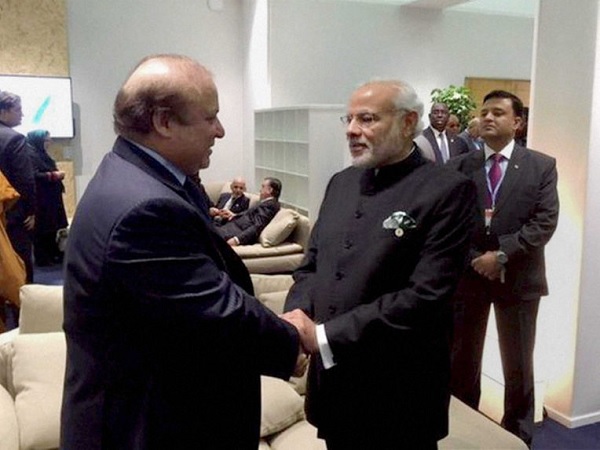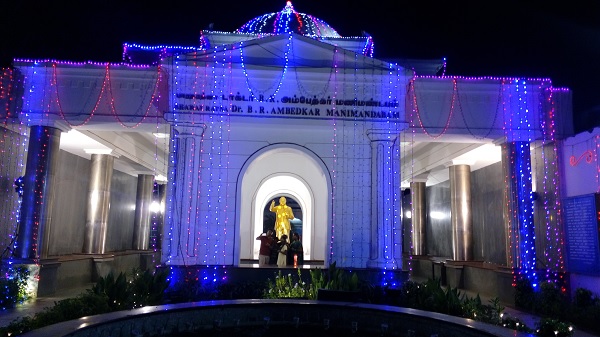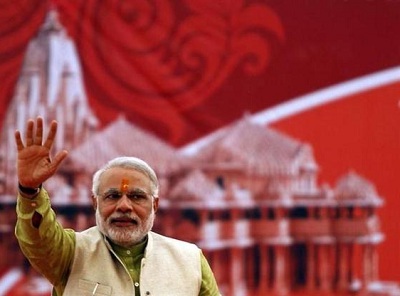
by Editor | May 25, 2021 | Muslim World

The Crown Prince of Abu Dhabi, His Highness Sheikh Mohammed Bin Zayed Al Nahyan meeting the Prime Minister, Shri Narendra Modi, at 7 RCR, in New Delhi (Photo PIB)
New Delhi: (IANS) Prime Minister Narendra Modi on Thursday held a restricted meeting at his 7 Race Course Road residence with visiting Crown Prince of Abu Dhabi and Deputy Supreme Commander of the UAE Armed Forces, General Sheikh Mohamed bin Zayed Al Nahyan.
“A meeting at 7RCR… HH Mohamed bin Zayed Al Nahyan meets PM @narendramodi at his residence,” the Prime Minister’s Office tweeted along with a picture of the two leaders.
“An exceptional tete-a-tete. PM meets Crown Prince for a restricted meeting at 7RCR before talks in the evening,” external affairs ministry spokesman Vikas Swarup also tweeted.
Earlier on Thursday, the crown prince, who arrived here on Wednesday on a three-day visit to India, was accorded a ceremonial welcome at the forecourt of the Rashtrapati Bhavan here.
On Wednesday, Modi broke protocol as he personally received the crown prince on his arrival here.
External Affairs Minister Sushma Swaraj also called on Sheikh Mohamed soon after his arrival on Wednesday.
A slew of agreements, including on defence equipment manufacturing and civil nuclear cooperation, are likely to be signed between India and the United Arab Emirates (UAE) during the crown prince’s visit.
After the India-UAE relationship was elevated to comprehensive strategic partnership during Modi’s visit to the UAE in August last year, the first by an Indian prime minister in 34 years, there is focus on new areas of cooperation like defence production in India, security, counter-terrorism, in nuclear and space sector, and in the energy sector.
The welfare of the expatriate Indians in the UAE, numbering around 2.6 million, is also likely to come up for discussion.
The crown prince is being accompanied by a high-level delegation comprising cabinet ministers, senior officials and business leaders.
Delegation-level talks between Modi and Sheikh Mohamed are scheduled to be held on Thursday evening following which the agreements will be signed.
On Friday, the crown prince will leave for Mumbai where he will visit the Bombay Stock Exchange and meet Indian business leaders.

by Editor | May 25, 2021 | News

Arvind Kejriwal
New Delhi(IANS) Delhi Chief Minister Arvind Kejriwal on Tuesday sought Prime Minister Narendra Modi’s resignation for ordering the CBI to raid his office, even as Modi declared that Finance Minister Arun Jaitley would come out in flying colours from the DDCA corruption charges.
Addressing a special session of the Delhi assembly, Kejriwal launched his most scathing attack on Modi while simultaneously asking him to sack Jaitley from the cabinet for his involvement in the financial bungling in Delhi’s cricket board – a charge Jaitley has denied.
The Congress also sought Jaitley’s resignation from the cabinet for the sake of his “dignity and honour”.
“I demand Prime Minister Modi’s resignation for the fraudulent raid he ordered to save Arun Jaitley,” the AAP leader said to thumping of desks by his party colleagues.
“He should feel ashamed,” Kejriwal thundered, referring to Modi and the December 15 raid by the Central Bureau of Investigation, which has denied searching Kejriwal’s office and said that it only targeted his principal secretary Rajendra Kumar for corruption.
The Delhi High Court meanwhile issued notice to Kejriwal and five other Aam Aadmi Party leaders in a defamation suit filed by Jaitley, who headed the Delhi and District Cricket Association for 13 long years and who has sought Rs.10 crore in damages from the AAP leaders.
The court sought replies from Kejriwal, Kumar Vishwas, Raghav Chadha, Ashutosh, Sanjay Singh and Deepak Bajpai by February 5. Jaitley will then file his reply in two weeks.
The court also asked Kejriwal and other leaders to file original documents relating to the allegations they have made against Jaitley.
Jaitley has also filed a criminal defamation complaint, saying the AAP leaders’ statements would cause “irreversible damage” to his reputation.
Addressing BJP MPs earlier in the day, Modi said Jaitley would come out in “flying colours” from the episode — just as veteran BJP leader L.K. Advani did when he was charged in the hawala case in the 1990s.
Modi said the Congress was unable to digest its electoral defeats since the 2014 Lok Sabha elections and was raking up manufactured allegations to defame his government.
BJP MP Kirti Azad, who has been alleging major corruption in the DDCA for years, did not attend the parliamentary party meeting, saying he had prior engagements. There is speculation the BJP was set to suspend Azad.
The prime minister’s comments came a day after Bharatiya Janata Party president Amit Shah described Jaitley as a man of honesty and integrity.
The Rajya Sabha’s working was repeatedly disrupted on Tuesday — four times before lunch — over the DDCA affair as Congress MPs shouted slogans against the government. The Lok Sabha’s proceedings too were marred.
Kejriwal told the Delhi assembly that the CBI raided his office – the CBI denies this happened – because he claimed it was looking for a file on the DDCA severely critical of Jaitley.
If Jaitley was indeed innocent, he should prove this to the Commission of Inquiry set up by the Delhi government, he said.
“The CBI said the chief minister was not raided… Only his principal secretary’s office was. If this is true, why did they enter my office?”
Kejriwal also accused Modi of constantly interfering in the functioning of the AAP government through Lt. Governor Najeeb Jung.
He alleged that despite 50 hours of interrogation spread over six days, the CBI had not been able to build a case of corruption against Rajendra Kumar. “They are mentally torturing him.”
Kejriwal poked fun at Modi for wearing a Rs.10 lakh suit last year, and demanded to know how a “chai wala” (tea seller) could afford such a costly suit.

by Editor | May 25, 2021 | News
 Islamabad:(IANS) Pakistani Prime Minister Nawaz Sharif has stopped his ministers from giving anti-India statements so that the peace process is not hit, an official said.
Islamabad:(IANS) Pakistani Prime Minister Nawaz Sharif has stopped his ministers from giving anti-India statements so that the peace process is not hit, an official said.
A close aide to Sharif said on Friday that the ministers and senior officials had been asked not to issue any statement that could damage the peace process.
“There will be statements only that encourage the dialogue process rather than digging out the past. The PM has asked the close aides and cabinet members to promote peace,” The Nation quoted an official as saying.
He said Sharif was optimistic about better ties with India, which would benefit the whole region.
Sharif was annoyed by statements from India that New Delhi only wanted to discuss Pakistan occupied Kashmir in talks, but understands this is not Inidan government’s policy, the official added.
Sharif, the official said, wanted to give top priority to Kashmir, terrorism and trade when the two sides discuss peace.
Another official said Sharif and the military leadership were on the same page to make peace with India.
“There is no difference of opinion and both agree that there should be no compromise on the stated position on key issues,” he added.
An interaction between Sharif and his Indian counterpart Narendra Modi in Paris and subsequent meeting of the National Security Advisors in Bangkok set the pace for improvement in the bilateral ties.
External Affairs Minister Sushma Swaraj also visited Pakistan on December 8 to attend the Heart of Asia conference.
She met Sharif and his advisor on foreign affairs Sartaj Aziz on the sidelines of the conference.
It is expected that Sharif and Modi will meet again in Switzerland in January. The two leaders will be together on January 20 to attend the 46th annual meeting of the World Economic Forum (WEF) in Davos-Klosters.
India’s outgoing High Commissioner to Pakistan TCA Raghavan on Thursday said the relations between the two countries were heading towards betterment.
Analysts said it was a positive development that Pakistan and India agreed to resume comprehensive dialogue to resolve all outstanding issues.

by Editor | May 25, 2021 | Economy, News
 New Delhi:(IANS) Prime Minister Narendra Modi on Friday lavished praise on Jawaharlal Nehru and hailed all previous governments as he struck a conciliatory note after two days of debate on B.R. Ambedkar that saw sparks fly between the opposition and treasury benches.
New Delhi:(IANS) Prime Minister Narendra Modi on Friday lavished praise on Jawaharlal Nehru and hailed all previous governments as he struck a conciliatory note after two days of debate on B.R. Ambedkar that saw sparks fly between the opposition and treasury benches.
Ending two days of discussions in parliament on the 125th birth anniversary of Ambedkar, widely seen as the architect of the constitution, Modi reached out to the opposition while underlining the diverse nature of the country.
Once the debate ended, Modi — for the first time since taking office in May 2014 — invited and met both his predecessor Manmohan Singh and Congress president Sonia Gandhi at his house and discussed the contentious GST.
A second meeting is expected after the Congress holds discussions within on the Goods and Services Tax.
In parliament, Modi made it clear that all governments had contributed in building India.
“No one can say that the earlier governments have not done anything for this country,” Modi said, looking at opposition MPs. “I am not saying this today. I have said this from the Red Fort.”
And in a rare gesture, the Bharatiya Janata Party (BJP) leader praised Nehru, India’s first prime minister, for his role in the constituent assembly and for his ability to concede other points of view.
He cited an incident when socialist leader Ram Manohar Lohia quoted statistics to tell Nehru that his government’s policy was wrong.
“Nehru said I cannot refute your statistics,” Modi went on. “He (Nehru)showed greatness.”
The prime minister’s tribute to Nehru was in contrast to the earlier sparring between Congress and BJP leaders over the legacy of Nehru and Ambedkar.
Modi lauded the role Ambedkar played in framing the Indian constitution without any bias although he suffering indignities because he was a Dalit.
“It was a tribute to Ambedkar’s personality that he bore all humiliation but there was no sense of revenge in him; the no sense of revenge is reflected in the constitution.
“To frame the constitution of a country like India, it is not easy.”
But Modi quickly pointed out that other leaders too played a key role in framing the constitution, which he described as “a binding force in a diverse country”.
And the spirit of the parliamentary discussion today was about “us” and not about “you” or “me”.
Earlier, the Congress and the BJP sparred in the Rajya Sabha.
Finance Minister Arun Jaitley referred to the subversion of the constitution by Hitler, making a not-so-subtle link to the imposition of Emergency by Indira Gandhi in 1975.
“Fundamental rights were snatched during the Emergency,” he said, and pointed out that “you imposed Emergency, detained opposition leaders, censored newspapers”.
Congress leader Ghulam Nabi Azad accused the Modi government of “manufacturing” intolerance, and said it was trying to “re-write history” by not crediting Nehru for the constitution’s preamble.
“We didn’t speak about Pandit Nehru even once. How is it possible that we are discussing the objectives of the constitution and we don’t mention Nehru.
“Nehru, Subhas Chandra Bose, Sardar (Vallabhbhai) Patel are being pitted against each other even though they aren’t alive. This is what is called intolerance.
“The atmosphere in the country in the last one-and-a-half years is against the constitution of India.”
Jaitley interrupted Azad by asking: “Why do you have so much grudge against Ambedkar?”
The Congress leader retorted: “You can talk about Hitler, and we cannot even talk about our first prime minister? This is intolerance.”

by Editor | May 25, 2021 | Opinions
 By Amulya Ganguli
By Amulya Ganguli
The 12 percent increase in the BJP’s vote share at the national level between 2009, when it secured 18.8 percent, and 2014, when this rose to 31, showed that a fairly large section of those who did not constitute the party’s traditional support base had voted for it. The reason for their support is known – Narendra Modi’s promise of rapid economic growth.
Two questions are relevant here. One is how many of those who chose the BJP, probably for the first time, have remained with it? The other is whether the party’s traditional supporters, who seemingly have less interest in the economy and development than in a pro-Hindu outlook, are influencing the party’s agenda.
According to a recent survey, Modi’s approval rating remains high. However, it is a curious feature of present-day politics that support for the prime minister cannot ipso facto be equated with support for his party. This strange outlook of the voters was highlighted by the Delhi assembly elections where the BJP was badly mauled.
But, otherwise, the party was able to hold its own in states like Maharashtra, Haryana and Jharkhand and even made inroads in Jammu and Kashmir. The outcome of the civic elections in Madhya Pradesh, Rajasthan and Karnataka has also underlined the BJP’s continuing influence.
Although the party appears to be well-entrenched, there is at least a section of its non-traditional supporters who may have become uneasy about some aspects of the government’s policies.
To be fair, such disillusionment is normal in any democracy where no ruling party can boast of cent percent support. Even then, there are bound to be some in the party’s 12 percent “extra” supporters who are currently engaged in mental balancing acts between the government’s positive and negative features.
While they will be hoping that it will pursue the promised economic reforms, they will also wonder whether an increasingly prosperous India will not also harbour intolerant sectarian elements.
What is more, these may not be driven by anti-Muslim sentiments alone as at the time of the BJP’s emergence from the margins of politics to centre-stage in the 1990s, but by attitudes involving minorities other than the Muslims which can also open up a divide between sections of the Hindus themselves, such as between vegetarians and non-vegetarians.
It is not surprising that Mumbai, with its cosmopolitan mix of communities, should be a focal point of such competitive parochialism and varying dietary preferences with the compulsively vegetarian Jains being sought to be placated with a ban on the consumption of meat during one of their festivals and a counter move by the Shiv Sena and Navnirman Sena to oppose the prohibition.
The controversy has been largely defused by a judicial directive allowing the sale of meat. But what the uproar has shown is how the BJP’s record can be hit by the various divisive impulses which are coming to the fore.
Mercifully, the apprehensions of communal acrimony have subsided because the government has apparently compelled the saffron hotheads to cool down. The attacks on churches have stopped though not the killing of rationalists.
But other issues which should have been allowed to remain very much in the background have raised their heads. Vegetarianism is one of them and the promotion of Hindi another. An RSS mouthpiece, Panchjanya, has argued that English should be “chased away” and Hindi encouraged “to become an organ of Bharat’s self-respect, progress and pride”.
Although the Panchjanya remembers the anti-Hindi agitation of the 1960s in Tamil Nadu, which made Jawaharlal Nehru say that English will remain one of the official languages as long as the non-Hindi speakers want it, the magazine tries to circumvent the episode by saying that “conspiracies were hatched to organize other Indian languages against Hindi” without advancing any credible evidence of such sinister plots.
Probably, the Rashtriya Swayamsevak Sangh (RSS) will ask the newly-appointed saffron apparatchiki in the Indian Council of Historical Research to unearth such proof. As a member of the Hindutva lobby has noted in the context of the saying that history is written by victors, “the so-called Hindu Right is the victor and a history will get a new coat of paint and varnish and also numerous designer alterations”.
If such observations are regarded as not representative of official views, this cannot be said of union Culture Minister Mahesh Sharma’s statements on imposing a ban on the sale of meat during the nine-day Navratri festival, making Hindi compulsory in schools and including Ramayana and Mahabharata in the school curriculum, but not the Bible and Quran since these do not reflect India’s “soul”.
His most quotable quote, however, was the observation that the former president, A.P.J. Abdul Kalam, was a nationalist “despite being a Muslim”.
Carrying on from where the culture minister had left off, Home Minister Rajnath Singh has ordered that all files should be signed in Hindi.
It is yet to be seen whether these diktats are floaters intended to test the public mood. But the non-saffron supporters of Modi cannot but be concerned about the articulations of important people in the government which contravene the country’s pluralist norms.
(Amulya Ganguli is a political analyst. The views expressed are personal. He can be reached at amulyaganguli@gmail.com)






